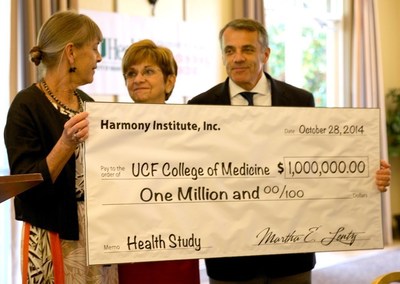ORLANDO, Fla., Oct. 28, 2014 /PRNewswire/ -- The UCF College of Medicine received a $1 million donation Tuesday from the Harmony Institute to research whether living in a community that encourages interaction between residents, animals and nature improves public health.

The Harmony Institute inspired the creation of the town of Harmony in Osceola County in 1998 as a master planned community designed to accommodate and encourage routine interactions with animals and the natural environment. The community includes 7,700 acres of preserved, natural space, two sand-bottom lakes and 12.5 miles of walking trails that give residents easy access to parks, open areas and a town center within a short walk. Harmony also features full cut-off, dark sky lighting, Energy Star homes and limits boat use on its lakes to non-fossil fuel crafts.
Its donation will fund the first three years of a longitudinal study conducted by UCF in partnership with the University of Miami on whether and how such a community impacts mental and physical health. The study will be similar in approach to the Framingham Heart Study, which has studied cardiovascular disease for the past 50+ years with generations of volunteer residents in the community of Framingham, MA. The Harmony donation will fund studies of how routine, daily interactions between residents, nature and animals impact health and the incidence of a variety of diseases. Studies will not only look at the impact of human-nature interaction on the individual but also on the health of families and the community across generations.
UCF's principal investigator will be Dr. Clyde McCoy, who is also a professor and chair emeritus of Miami's Department of Public Health Sciences. He will work with a board of top tier researchers from Harvard, Yale, Tufts, Purdue and Louisiana State University, who will determine the research topics having the greatest potential impact on public health.
"For the first time in history, we have the opportunity to look at every aspect of what's in a community and how it contributes to health and wellness," Dr. McCoy said. "Framingham is the most valuable longitudinal study we have. But now we have the opportunity to look at factors far beyond the individual and look at how the environment impacts the health of a community, a family and the individual. This is a unique opportunity we have never had before."
He offered several examples of the kinds of research the Harmony study could address that could be applied to communities across the nation and world:
- Current research shows that low-impact exercise like walking improves cardiovascular health. But does a community -- that encourages residents to walk to shopping, to walk their dogs while they interact with nature, and has walking trails just steps from homes --have a dramatically lower incidence of cardiovascular disease, diabetes and even cancer?
- Do children who are exposed to natural sciences in their home environment excel or pursue studies in those fields as adults?
- Current research shows that traditional street lighting produces light trespass which can cause sleep deprivation and may have a relationship to the incidence of breast cancer. What are the health impacts for residents living in a "dark sky" community?
- What is the microbiology of a healthy community? Does the frequent use of antibacterial soaps and cleansers negate the impact of beneficial bacteria in the environment?
"Ultimately we hope that parts of this study will encourage a change in public policy to require future communities to include an ability for residents to have routine access to animals and the natural environment," said Martha Lentz, founder and president of the Harmony Institute. "People, particularly children, should not be deprived of the opportunity to live in healthy communities."
About 100 people, including Osceola County elected and government officials, researchers and Harmony residents, attended Tuesday's check presentation to Drs. Deborah German, vice president for medical affairs and founding dean of the UCF College of Medicine and Pascal Goldschmidt, senior vice president for medical affairs and dean of the University of Miami'sLeonard M. Miller School of Medicine. As Mrs. Lentz showed the giant $1 million check, the crowd stood and cheered.
Dr. German said the possibilities for research with the Harmony grant "are as infinite as our imaginations. We are going to study how a living environment can impact our lives, increase our longevity and decrease disease."
Dr. Goldschmidt described how the gift had created a unique partnership between a new and an established Florida medical school that could have far-reaching implications for living healthfully in a fast-changing, high-stress world. "With the combined forces of our two institutions, we will be able to compete with all the research institutions in the country and do work that is landmark," he said.
Harmony residents and scientists stressed that findings of research would not only document the health benefits of living in a community specifically built to encourage daily interactions between nature and humans, but could apply to residents and builders in any area. "This is not just about one community," said Dr. McCoy, who has studied public health for 45 years. "This is our opportunity to make a global impact."
CONTACT: Wendy Spirduso Sarubbi, Director of Communications, UCF College of Medicine, 407-266-1418 (office), 407-409-2404 (cell) or wendy.sarubbi@ucf.edu
Photo - http://photos.prnewswire.com/prnh/20141028/155019
SOURCE The UCF College of Medicine
